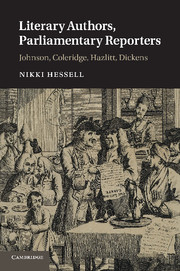Book contents
- Frontmatter
- Contents
- Acknowledgments
- Preface
- Chapter 1 Introduction: reporting and the individual talent
- Chapter 2 Samuel Johnson: beyond Lilliput
- Chapter 3 Samuel Taylor Coleridge and the freedom of the gallery
- Chapter 4 William Hazlitt and the real eloquence of the British Senate
- Chapter 5 Charles Dickens and the ghost of speeches past
- Chapter 6 Conclusion: taking parliamentary reporting seriously
- Bibliography
- Index
Chapter 2 - Samuel Johnson: beyond Lilliput
Published online by Cambridge University Press: 05 November 2011
- Frontmatter
- Contents
- Acknowledgments
- Preface
- Chapter 1 Introduction: reporting and the individual talent
- Chapter 2 Samuel Johnson: beyond Lilliput
- Chapter 3 Samuel Taylor Coleridge and the freedom of the gallery
- Chapter 4 William Hazlitt and the real eloquence of the British Senate
- Chapter 5 Charles Dickens and the ghost of speeches past
- Chapter 6 Conclusion: taking parliamentary reporting seriously
- Bibliography
- Index
Summary
In the records of the British House of Commons for April 1738, sandwiched between a debate on the bill for securing trade to America and another on the Button and Button-Hole Bill, lies an important slice of journalistic history. The Speaker informed the House that “he had in his hands a printed News Paper, which contained his Majesty’s Answer to their late Address, before the same had been reported from the Chair, the only way of communicating it to the public.” The Speaker urged the assembled MPs to find a way to stop the publication of parliamentary business, which had for many years been tolerated as long as the publication occurred during the recess. After a short debate, the House resolved that it was a “notorious breach of the Privilege” for anyone to publish the debates.
One of the London journalists affected by the new arrangements for reporting Parliament was the young Samuel Johnson. Johnson had worked for Edward Cave’s Gentleman’s Magazine since 1737 and was probably involved in establishing the new mode of parliamentary coverage that the Gentleman’s Magazine adopted in the wake of the 1738 ban. The rival London Magazine, edited by Thomas Astley, had unveiled its approach in May 1738, depicting the debates as the proceedings of a political club in which speakers took the parts of the parliamentary orators. Classical pseudonyms, some invented and some implying connections with real historical figures, were used to screen the names of the speakers, with the Prime Minister Robert Walpole, for example, now appearing as “M. Tullius Cicero.” The Gentleman’s Magazine responded in the following month with “Debates in the Senate of Lilliput,” a series that purported to be coverage of political speeches from Lilliput provided by Gulliver’s grandson. A series of Swiftian names was devised to cover speakers, countries and regions, as well as common parliamentary terminology; thus Walpole became “Walelop,” while the members of the Lords and Commons were “Hurgoes” and “Clinabs” respectively. The magazines also delayed publication of most debates and mixed up the chronological sequence in order to protect themselves from prosecution.
- Type
- Chapter
- Information
- Literary Authors, Parliamentary ReportersJohnson, Coleridge, Hazlitt, Dickens, pp. 17 - 60Publisher: Cambridge University PressPrint publication year: 2011



